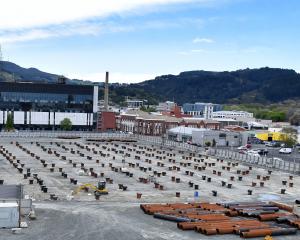
After seven years of effort, the cost of the new Dunedin hospital has risen by about 50% and the main building has had piling completed but nothing else.
What went wrong? What can we learn?
I have long pondered these questions. I find myself concluding "it's cultural", hardly an exciting finding but probably accurate, nonetheless.
For decades the New Zealand health system has not managed its capital expenditure well. There has never been a national plan of capital works that is the equivalent to New Zealand's 10-year roading plan, for example.
Health capital works funding has fluctuated significantly from Budget to Budget, from $1 billion a year to nothing.
In the Labour government I was part of there were nine years of continual hospital renewal from Kaitaia to Invercargill, including large projects such as Waitakere and Wellington.
But the momentum was not maintained, and so official expertise has dissipated. On the return of a Labour government seven years ago, that lack of expertise was laid bare.
The result has been ongoing delay, examined yesterday, but there is also a bunch of cultural behaviours that are still in play today.
One such behaviour is indecision. A question referred upstairs might bounce around indefinitely, with no answer or guidance emerging, ever.
From the beginning of the Dunedin project, even a simple internal consultation process has taken a long time.
For example, in 2018 it took about 10 weeks from choosing the new hospital site to announcing it.
Another such behaviour is relitigating. Decisions are taken then revisited, often a year or more later. Some of this is to be expected, even welcomed.
But relitigating has become an alternative to action. It has become much more cavalier in this project than is healthy or necessary.
Low trust is another manifestation of a poor culture. In my assessment, the most able and committed people on the Dunedin hospital project live and work locally, yet they are not entrusted with any expenditure decisions. Not any.
Perhaps the most powerful display of dysfunction is the rate of turnover of key players.
In the past seven years I can count seven different officials at the deputy director level of the Ministry of Health [or the equivalent now Te Whatu Ora is established].
These are the people who report direct to ministers on the project.
Another function, that of the "senior responsible owner", has been held by nine different people. The role I played for several years, chairing the governance group, has at last count been held by four different people.
All of these changes represent people resigning, or getting sacked. The sackings have come thick and fast, and they are continuing today.
Programme managers are a good case in point. They run the show locally. They are the boss, day to day.
The first such person, who has built about 10 hospitals, mostly offshore, was sacked two years ago.
In recent weeks his successor who is on his third hospital was also sacked.
At the time of writing, the next programme manager might well be a group of people, none of whom has built a hospital to my knowledge.
About the only sacking that has made sense to me was my own, by the same Cabinet who appointed me.
The project had moved from planning to construction, and I have no construction experience. Cabinet appointed someone who did, while I remained as an ordinary member.
Most other sackings have made little sense. We have been operating in a small-minded blame culture.
For the seven years that I have had an association with this project, governance has been a mess.
Lines of accountability are a blur. Multiple different structures have been tried but none has worked, because officials can never let themselves entrust a Cabinet-appointed governance group.
So they second-guess it.
Probably officials should take the lead and engage external "grey head" advisers if they want to. If not, they should delegate clear responsibility to those external "grey heads" and get out of the way.
Most of all, New Zealand needs to adopt a multi-year programme of hospital building so that communities and the construction industry know what is coming their way, when.
That means that governments of all stripes must fund health capital much more predictably than they do now, just as they do for roads or schools.
Only then will experience gather steam. Confidence will follow and the sector can gain a cultural maturity it currently does not have.
Pete Hodgson is a former chairman of the new Dunedin hospital governance group, a former chairman of the Southern District Health Board and a former Labour Minister of Health. He is not a health professional and has no construction experience.










